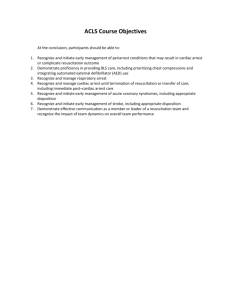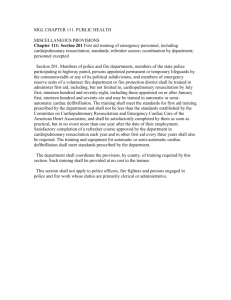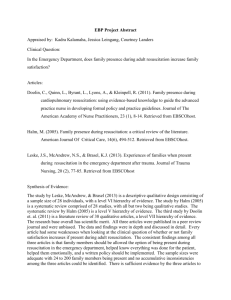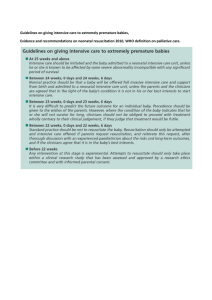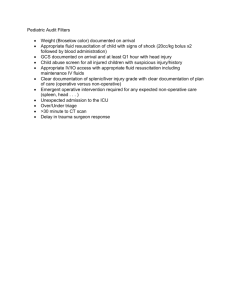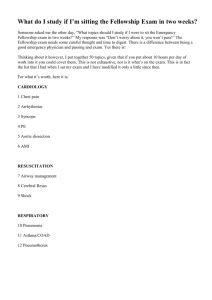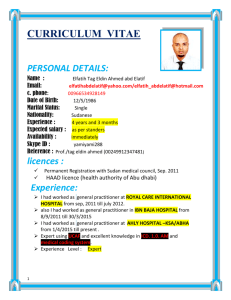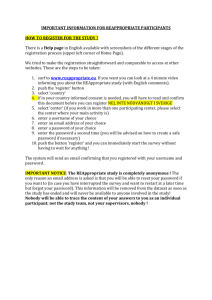Health and Safety
advertisement
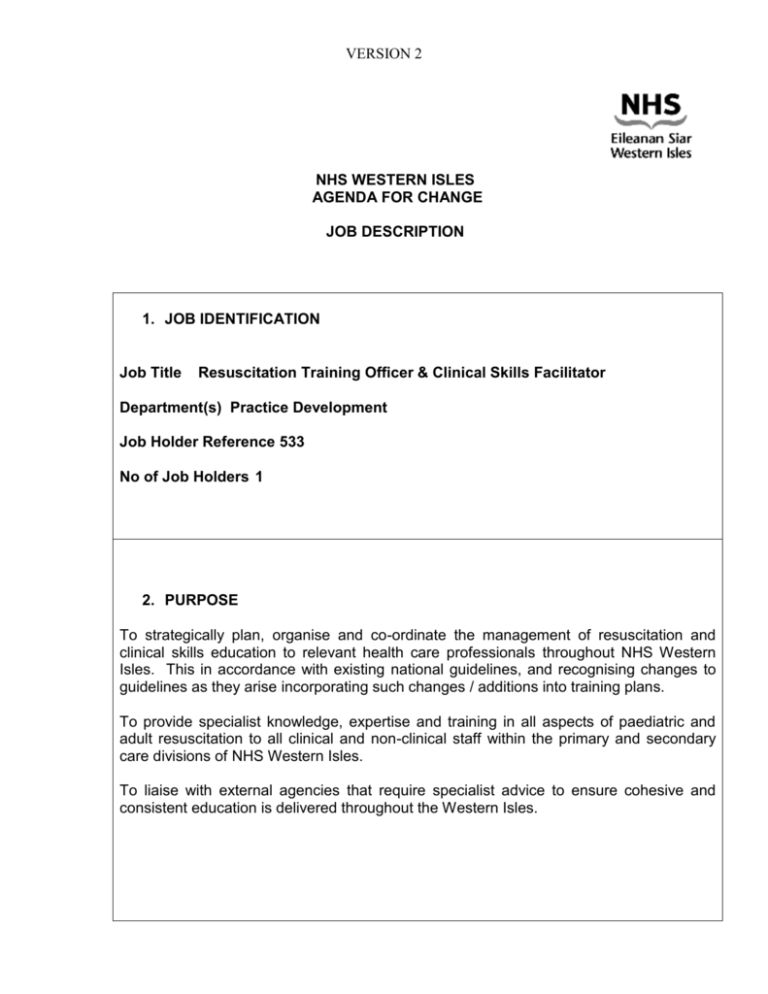
VERSION 2 NHS WESTERN ISLES AGENDA FOR CHANGE JOB DESCRIPTION 1. JOB IDENTIFICATION Job Title Resuscitation Training Officer & Clinical Skills Facilitator Department(s) Practice Development Job Holder Reference 533 No of Job Holders 1 2. PURPOSE To strategically plan, organise and co-ordinate the management of resuscitation and clinical skills education to relevant health care professionals throughout NHS Western Isles. This in accordance with existing national guidelines, and recognising changes to guidelines as they arise incorporating such changes / additions into training plans. To provide specialist knowledge, expertise and training in all aspects of paediatric and adult resuscitation to all clinical and non-clinical staff within the primary and secondary care divisions of NHS Western Isles. To liaise with external agencies that require specialist advice to ensure cohesive and consistent education is delivered throughout the Western Isles. VERSION 2 3. ORGANISATIONAL CHART 4. SCOPE AND RANGE Lead and deliver resuscitation training throughout NHS Western Isles including adult and paediatric Basic Life Support (BLS), Immediate Life Support (ILS), Advanced Life Support (ALS), Paediatric Immediate Life Support (PILS) European Paediatric Life Support (EPLS), and re-certification sessions. Provide specialist knowledge and advice on all aspects of paediatric and adult resuscitation to staff throughout NHS Western Isles Provide specialist advice and training on all aspects of resuscitation to carers, organisations and external healthcare providers in the Western Isles on a contractual basis Write policies and guidelines for resuscitation and clinical skills practice within NHS Western Isles, ensuring adherence to national guidelines and standards. Lead and deliver a clinical skills teaching programme as required, meeting the needs of the organisation. Audit and provision of resuscitation and clinical skills statistics for organisational use. Audit –cardiac arrest trolleys, cardiac arrest response log, cardiac arrest call outs. Other audit as necessary through changes to practice and research. Participate in research and development, incorporating this into resuscitation VERSION 2 and clinical skills training. Ordering of essential teaching equipment for resuscitation and clinical skills training/teaching sessions. Organise and direct Resuscitation Council accredited life support courses. Supervise the Administrative Support to the Professional Practice Development Team. Supervise the collation of course programmes for distribution, ensuring the documentation of resuscitation and clinical skills teaching statistics is completed. Participate on 2 external Resuscitation Council accredited Advanced Life Support course per year, as a member of teaching faculty Ensure clean, tidy and safe learning environment. KNOWLEDGE, TRAINING AND/OR EXPERIENCE REQUIRED TO DO THE JOB 1st level of Nursing & Midwifery Council Register. Educated to degree level. Excellent communication skills. Extensive clinical experience in a critical care environment i.e. ITU, CCU, A&E, HDU Ability to work autonomously Possess current certificates in Advanced Life Support (ALS) and European Paediatric Life Support (EPLS) Instructor for ALS and EPLS and desirable to have Generic Instructor Course (GIC) instructor status. Registered Resuscitation Council (UK) Course Director. Excellent knowledge regarding basic to advanced resuscitation. Excellent planning and organisational skills to enhance and optimise the training programme development to meet changing needs of clients as well as research and evidence-based practice. Possess knowledge of local and national guidelines, policies, practices and procedures relating to all aspects of resuscitation and clinical skills. Knowledge of current issues relating to resuscitation and clinical skills. Excellent teaching and presentation skills. Possess leadership, management and organisational skills. Commitment to own professional development, which may include education at Masters level or Post Graduate certificate in Education, is desirable. Possess critical, analytical and problem solving skills. Positive and pleasant attitude Ability to motivate others Good technical knowledge and skills. Possess comprehensive IT skills. VERSION 2 5. MAIN DUTIES/RESPONSIBILITIES Plan and prioritise workload unsupervised. Be responsible for the development of resuscitation and clinical skills education within the Professional Practice Development Team. Be responsible for the planning, implementation and evaluation of all aspects of adult and paediatric resuscitation education and practice within NHS Western Isles. Communicate effectively with colleagues and other healthcare professionals within the multidisciplinary team to ensure best practice care is delivered. Organise and run National Adult and Paediatric Advanced Life Support Courses; Immediate Life Support and Immediate Life Support re-certification Courses; Paediatric Immediate Life Support and Paediatric Immediate Life Support recertification courses and Basic Life Support unsupervised. Co-ordinate and deliver advanced clinical skills sessions including anaphylaxis management, acute coronary syndrome, advanced airway management, paediatric study days, and medical emergencies including scenario training to all members of the multidisciplinary team. Deliver a full resuscitation induction programme to medical staff attending the Western Isles Hospital 3 / 4 times per year to include equipment familiarisation; recognition of the sick adult and child; adult and paediatric life support; airway management; and introduction to the Acute Coronary Syndrome and Stroke integrated care pathways. Assist with medical education, which involves teaching PRHO’s clinical skills as Arterial Blood Gas Sampling, recording an ECG, venepuncture and cannulation, male urinary catheterisation and advanced airway management. Co-ordinate and deliver extended scope of practice training for nursing staff including recording an ECG, venepuncture and cannulation, male urinary catheterisation Assess, evaluate and provide feedback on candidate skills, competencies and knowledge base during teaching and training sessions. Plan, evaluate and provide feedback on clinical emergencies training incorporating the use of CD roms, distance learning and e-learning for further information. Participate in Research and Development by reading, critiquing and implementing research and evidence-based findings into resuscitation and clinical skills teaching. Co-ordinate research projects in resuscitation practice within NHS Western Isles and nationally as part of the Scottish Resuscitation Group. Undertake Cardiac Arrest Call Audits and Emergency Trolley / Emergency Equipment Audits throughout NHS Western Isles. Ensure knowledge base is current in conjunction with recent research and evidence-based findings. Act as an expert resource guide for healthcare professionals regarding resuscitation and clinical skills. Develop new and review and update existing policies regarding resuscitation and resuscitation issues ensuring adherence to national resuscitation guidelines. Audit. Encourage evidence-based practice as recommended by Nursing and Midwifery VERSION 2 Council by utilising current research findings and statistics. Attend in hospital cardiac arrests. This role may involve supporting or leading the cardiac arrest team, provision of basic life support, intravenous or intraosseous cannulation, administration of intravenous medication, airway management – basic to advanced, identification of cardiac rhythms, safe defibrillation and accurately following,( and guide the other members of cardiac arrest team to follow) the Resuscitation Council Universal Algorithm. Provide knowledge regarding intravenous drug administrating regimes. Implementation of life saving interventions. Provide support and counselling to staff involved in resuscitation attempts. This will include a debriefing session and discussion following each cardiac arrest with the members of multidisciplinary team involved. Determine requirements for and advise, recommend and provide resource material regarding resuscitation equipment suitability. Ensure appropriate resuscitation drugs and equipment are standardised and available within each clinical area. Ensuring effective use of resources involving stock control and ordering of clinical materials required for training. Liaise with United Kingdom Resuscitation Council and other agencies related to resuscitation and clinical skills. Maintenance of accurate records in regard to training attendance, cardiac arrest log, cardiac arrest call outs, minutes of meetings and training statistics. Attend regular departmental meetings Attend relevant organisational meetings Attend Scottish Resuscitation Group meetings. Provide external resuscitation training as and when required. Manage, co-ordinate and oversee the continuing professional development of the Clinical Skills Instructor and Administrative Support for the Professional Practice Development Team Ensure legal and statutory requirements are met and that working conditions comply with health and safety legislation. Ensure that Human Resources policies and procedures are implemented fairly and consistently across all areas of responsibility. Set, monitor and improve standards for staff within area of responsibility. Manage the budget for resuscitation training as allocated, and manage the budget from the income received by running national advanced life support courses, ensuring compliance with the Health Boards standing financial instructions. 6. SYSTEMS AND EQUIPMENT VERSION 2 Provide monthly statistical information and data for reports, which are issued to Practice Development Manager, medical education, nurse managers, ward managers, resuscitation committees, Director of Nursing, Midwifery and AHP’s. Accurate documentation of cardiac arrest call outs and accurate completion of cardiac arrest audit forms. Enter course evaluation scores onto database for evaluation and audit purposes. Documenting data regarding cardiac arrest trolley checks. Defibrillator data card downloads. Enter data in cardiac arrest response log. Manual record keeping. Multimedia data projectors. Simman. Heart Sim. Resuscitation manikins. Defibrillators. Airway adjuncts. Desktop computer. Laptop. Utilisation of software packages, Excel, Microsoft Word, Power Point, Outlook, Internet and Intranet. Telephone. Printer. Movement of tables and chairs for teaching and training sessions. Photocopier. Clinical skills manikins. Maintenance of manikins and replacement of parts for manikins. Venepuncture and cannulation equipment. Arterial blood gas sampling equipment. Male urinary catheterisation equipment. Cardiac arrest trolleys. Blood pressure recording equipment, sphygnanometer and/or dynamap. Pulse oximeter. Portable suction equipment. Intravenous infusion devices. ECG machines. 7. DECISIONS AND JUDGEMENTS Demonstrate excellence in resuscitation procedures ensuring evidence based VERSION 2 practice is followed by all team members. Manage Clinical Skills Instructor and Admin Support To Professional Practice Development Team. Provide independent consultation on matters regarding resuscitation to staff, parents / carers and outside agencies ensuring adherence to national guidelines and standards. Decisions relating to workload, inclusive of effective utilisation of staffing levels. Unsupervised teaching at all times but perform peer appraisal on a regular basis to assess teaching methods and delivery. Managerial decision making skills required to ensure effective administration for courses, including dealing with the difficult/incompetent candidate. Provision for decisions relating to appropriate training for healthcare professionals. This involves assessment of work place and competencies and training required by staff. Resource expert for hospital staff in relation to resuscitation matters. Review resuscitation policies on a regular basis or as necessary depending on current research/evidence based practice. 8. COMMUNICATIONS AND RELATIONSHIPS The post holder will develop effective communication strategies with a wide range of people to ensure delivery of the resuscitation and clinical skills training programme and management of clinical emergencies. There will be formal and informal communication via or with: Communicate with service staff via telecommunication network, email and on a personal basis. Plan, develop and deliver presentations. Provide empathy, counselling skills, reassurance and sensitive verbal communication skills to staff involved in resuscitation attempts and those attending training/teaching sessions. Communicate effectively with all members of the resuscitation/clinical skills and nursing and midwifery practice development teams. Verbal communication with all members of the multidisciplinary team regarding the changing culture of resuscitation, this may lead to conflict of opinion. Candidates. Patients. Provide specialist advice to colleagues and all healthcare professionals. Engineering department. Heads of Department External Agencies Resuscitation Committee. Educational Institutions and bodies Members of the Scottish Resuscitation Group. Staff from the clinical audit department. Administration/clerical staff. VERSION 2 Faculty members involved in Advanced Life Support courses. Relatives/carers. Liaise and negotiate with company representatives with regard to new products available for resuscitation and clinical skills teaching. 9. PHYSICAL AND EMOTIONAL DEMANDS OF THE JOB Attendance of cardiac arrests, physically, mentally and emotionally demanding, due to the sudden and unexpected nature and urgency of the emergencies, as well as the uncertain outcome. Due to the unexpected nature of cardiac arrest death issues are both mentally and emotionally demanding. This also involves dealing with bereaved relatives, distressed staff and personal mortality. Dealing with staff post resuscitation attempt regarding emotional, ethical, legal issues and also Do Not Actively Resuscitate orders. Effective time management skills required in order to ensure effective utilisation of designated training, administrative and clinical time. Continuous assessment and evaluation of candidate’s skills and knowledge, demands high levels of concentration for long periods of time. Appraisal of the difficult or challenging candidates on training sessions. Provide candidates and healthcare professionals attending teaching sessions with unplanned and emotional issues regarding resuscitation with advice, support and reassurance. Physical demands, which includes the movement of heavy equipment, physically demonstrating resuscitation procedures and technical skills. Transportation of heavy resuscitation equipment to other hospitals and departments within the organisation as required. Preparation and closure of training sessions. Meeting deadlines to ensure timely completion of reports, training and presentations. High levels of concentration required for managerial meetings. Driving to meetings, courses and training sessions within the organisation. This varies depending on requirements to meet the needs of the service. Keyboard skills, which involves using a desktop and laptop computer. 10. STANDARD ELEMENTS VERSION 2 These are sections that will be generic and included in every job description and will Include confidentiality, health and safety and avoiding discrimination. Example sections are noted below: Confidentiality This involves taking the necessary precautions when transmitting information only disclosing it to those who have the right and the need to know it. All personal health information is held under strict legal and ethical obligations of confidentiality. NHS Staff must follow guidance (NHS Code of Practice on Protecting Patient Confidentiality) before disclosing any patient information. All staff must respect confidentiality of all matters that they may learn relating to their employment, other members of staff, patients and their families. Health and Safety: Assist in maintaining own and others’ health, safety and security. This involves: a) Complying with Board health and safety policies, procedures and participating in mandatory training. b) Maintaining a safe working environment and reporting any issues of concern as appropriate. NHS Western Isles attaches the greatest importance to the health and safety of its employees. It is the Board policy to do all that is reasonable to prevent personal injury and hazard to health by protecting staff and others including the public from foreseeable hazards compatible with the provision of proper services to patients. The Board expects its entire staff to take reasonable care of their own health and safety and that of others who may be affected by their acts or omissions at work. More detailed information is given in departmental safety policies where appropriate. Ensure own actions support equality, diversity and rights. This involves: (a) Acting in ways consistent with the Board’s policies and procedures. (b) Treating those you come into contact with equitably and with respect. (c) Recognising the need for aids or adaptations. VERSION 2 JOB DESCRIPTION AGREEMENT I, (Print Name)…………………………………………………….. confirm that the job description(s) /person specification(s) attached have been discussed with me and are an accurate and up-to-date account of the duties and responsibilities and skills/qualifications required to undertake the post. Job Holder’s Signature: Date: Head of Department Signature: Date: VERSION 2 NHS Western Isles Person Specification Resuscitation / Clinical Skills Facilitator Criteria Essential Attributes: 1. Qualifications & 1st level registration. Training Degree or working Level of Education towards. professional qualifications, A.L.S. Instructor / training and learning instructor candidate or programmes/courses. instructor potential 2. Experience Length and type of experience, level at which experience gained. 3. Knowledge Depth and extent of knowledge. Several years post registration. Acute / Critical background. Experience in teaching. Teaching qualification Excellent knowledge of basic and advanced life support in adults Excellent knowledge of clinical skills practice. Knowledge of Training/skills equipment use Paediatric knowledge and skills Knowledge of Medical/Nursin g educational needs (Under and post graduate level) Audit Programme development. 4. Skills/Abilities Range and level of skills i.e. communication (oral, written, presentation), planning/organisation numeracy, leadership etc. 5. Specific Job Desirable: Masters Degree APLS, PALS ,EPLS, GIC Excellent communication skills Presentation/Teaching skills. Good Organisational Skills IT literate Car driver essential. VERSION 2 Requirements Environmental conditions, unsocial hours, car driver etc. Flexibility to meet training needs of a wide variety of staff. Signed: Date: Print Name: Designation:
